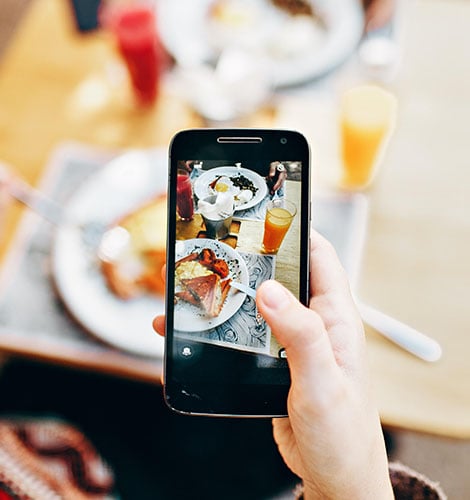Welcome to the exciting world of restaurant marketing, where food meets flair and flavor meets finesse. As you embark on this culinary journey, imagine your restaurant as a masterpiece, and marketing as the brush that brings it to life on a broader canvas. Yet, just like in any art form, there are some rookie restaurant marketing mistakes you’ll want to avoid. Think of it as seasoning your marketing strategy with a dash of wisdom to make your restaurant truly stand out. So, let’s cook up a storm and explore how avoiding these common restaurant marketing mistakes can turn your restaurant into the talk of the town.
Not Having a Clear Marketing Strategy and Not Knowing Your Target Audience
One of the biggest restaurant marketing mistakes is not having a clear marketing strategy. As restaurant owners, a well-defined marketing strategy serves as the compass guiding all promotional efforts. Without it, your restaurant’s messaging becomes scattered, and your promotional activities lack a cohesive direction, potentially leading to confusion among potential customers.
A clear marketing strategy outlines your goals, defines your unique value proposition, and identifies the tactics you’ll employ to reach your target audience. It provides the framework for consistent branding, messaging, and customer engagement. Without this strategic foundation or even a marketing budget, your restaurant’s messaging can appear haphazard, leaving potential customers unsure about what your establishment stands for and what sets it apart.
Moreover, a lack of a marketing strategy can lead to inefficient resource allocation. You might invest time and money into marketing channels for new customers that yield minimal returns while neglecting those that could deliver higher impact. This can drain your budget and leave you without a clear understanding of where your marketing efforts are falling short.
Furthermore, failing to understand your target audience is akin to preparing a meal without knowing your guests’ tastes and preferences. Identifying your ideal customers allows you to tailor your marketing initiatives to resonate with their needs and desires. By comprehending their demographics, preferences, and behaviors, you can craft compelling messages and experiences that resonate deeply, fostering a stronger connection and loyalty among your patrons. In essence, avoiding these restaurant marketing mistakes ensures that every marketing effort is purposeful, finely tuned, and designed to create a lasting impact in the ever-competitive culinary landscape. You can start getting a clearer target audience by creating a customer persona as part of your marketing strategies.
In a competitive market, having a clear marketing strategy and a specific target audience is not just a luxury but a necessity. It allows you to make informed decisions, allocate resources effectively, and create a consistent and compelling brand presence. It’s the cornerstone upon which you build your restaurant’s identity, engage your audience, and drive sustained business growth.
Neglecting your Brand-Identity
The most significant marketing mistakes you can make in restaurant marketing is failing to establish a clear and consistent brand identity. Your brand is not just your logo although you can create a wonderful long lasting impression logo; it encompasses your restaurant’s personality, values, and unique selling points. Without a well-defined brand identity, you risk sending mixed messages to your audience. Ensure that your branding elements, including your logo, color scheme, and tone of voice, align with your restaurant’s essence.
A restaurant’s brand identity is the holistic essence that encapsulates its core values, personality, unique attributes, and the emotional connection it aims to forge with its target audience. When this identity is left undefined or inconsistently portrayed, the harmony is disrupted, and the message becomes muddled. Potential customers may find themselves perplexed, unsure about what your restaurant represents and what kind of experience they can anticipate.
By tending to your brand identity, you ensure that every interaction, whether visual or experiential, aligns with a coherent narrative. This consistency creates a sense of familiarity and trust, fostering a connection that extends beyond the mere act of dining. A well-crafted brand identity imparts your restaurant with a personality, an allure that becomes synonymous with memorable experiences and delectable offerings.
Inconsistent Content Creation for your Marketing Campaign
Consistency is key in restaurant marketing. Posting sporadically on social media, updating your blog irregularly, or neglecting digital marketing and even traditional marketing can lead to a lack of engagement and interest. Develop a content calendar that outlines your posting schedule across various platforms. Regularly share diverse content, such as new menu items, chef interviews, culinary tips, and stories about your restaurant’s journey.
Inconsistency in your posting schedule can confuse your audience and lead to a decline in engagement. Create a consistent posting schedule across all platforms to maintain visibility and keep your audience engaged. Avoid marketing mistakes and your online presence and restaurant businesses will thrive and capture those loyal customers you want that will keep coming back for more.
Undervaluing Social Media Marketing and Email Marketing
While it’s important to be present and consistent on multiple social media platforms, spreading yourself too thin can lead to inconsistent posting and diluted engagement. Focus on the platforms that align with your target audience and where you can maintain a strong and active social media presence for your social media marketing strategy and social media accounts.
And while we would like to hype up our social media account, we cannot forget that email marketing remains an effective marketing strategy and way to stay connected with your audience. Some restaurants make the mistake of overlooking this valuable tool. Build an email list and customer database by offering incentives such as exclusive discounts or freebies. Send out regular newsletters with updates about your menu changes, special events, your loyalty program, new restaurant information and promotions. Personalized and targeted email campaigns can drive customer loyalty and repeat business.
Not Analyzing and Tracking Your Data
Without data-driven insights, you’re essentially operating in the dark. Failing to track and analyze marketing metrics prevents you from understanding what strategies are effective and what needs improvement. Have your marketing team utilize tools like Google Analytics and social media insights to monitor website traffic, engagement rates, and customer behavior. Use this data to refine your marketing operations approaches over time.
Even if you’re tracking data, failing to analyze and act on the insights can hinder your marketing efforts. Data without action is meaningless. Regularly review your analytics data to identify trends, opportunities, and areas that need improvement. Adjust your marketing strategies based on the data to optimize your efforts for better results.
Ignoring Local SEO Strategies and Local Partnerships
Another common marketing mistake restaurant owners can easily make is ignoring local SEO strategies and local partnerships. Local search engine optimization (SEO) is paramount for attracting nearby customers. Neglecting to optimize your online presence for local searches can hinder your restaurant’s visibility. Ensure your restaurant’s name, address, and phone number are consistent across all online platforms. Additionally, create a Google Business Profile and encourage patrons to leave reviews to enhance your local SEO efforts. You can even hire a marketing agency to help with your local organic marketing strategies.
Also collaborating with local businesses, influencers or even local restaurants can also be a powerful marketing strategy. Some restaurants make the mistake of not tapping into the potential of partnerships with nearby hotels, event venues, or food bloggers. These collaborations can expand your reach, introduce your restaurant to new audiences, and create mutually beneficial promotions.
Ignoring Customer Reviews and Feedback
Online reviews can make or break a restaurant’s reputation. Failing to monitor and address customer reviews, both positive and negative, can damage your credibility. Responding graciously to negative reviews shows that you value customer feedback and are committed to improvement. Conversely, expressing gratitude for positive reviews fosters a sense of appreciation among your patrons and also makes them feel valued to keep coming back. The way your guests perceive your business online is by looking at other customer’s previous experience at your restaurant and looking at what type of review that customer leaves. In turn, customer reviews are an integral part to your restaurant marketing strategy and should not be ignored.
Also, with the customer reviews, customer feedback is a goldmine of insights that can help you refine your marketing strategies. Not actively seeking feedback or ignoring customer suggestions can lead to missed opportunities for improvement. Use surveys, comment cards, and social media polls even mobile marketing to gather feedback and show customers that their opinions matter.
Not Providing Quality Visuals and Having an Online Presence
In the digital age, a strong online presence is non-negotiable. Many restaurants make the mistake of underestimating the impact of a well-designed restaurant website, active social media pages, and positive online reviews. Invest in a user-friendly website that showcases your menu, provides essential information, and enables online reservations or online ordering. Regularly update your social media profiles with high-quality visuals and engaging content to connect with your audience on a personal level.
In today’s mobile-driven world, not optimizing your restaurant website and online ordering system for mobile devices or tablet users can be detrimental. Many potential customers use smartphones to browse for restaurants, view menus, and make reservations. A restaurant website that isn’t mobile-friendly can lead to a frustrating user experience and deter customers from engaging with your brand.
Humans are highly visual beings, and this holds true in restaurant marketing as well. Using low-quality images or failing to showcase your fantastic food in an appealing manner can deter potential customers. Invest in professional food photography that captures the essence of your cuisine. High-quality visuals on your website, social media, and marketing materials can entice customers to visit your restaurant and is just overall good marketing strategies for your business.
Also, your menu is a powerful marketing tool. If it’s cluttered, lacks descriptions, or is difficult to read, customers might be overwhelmed or disinterested. Invest in a well-designed menu with enticing descriptions and appealing visuals to help new customers make informed choices.
Ignoring Seasonal and Holiday Marketing
Seasonal and holiday promotions provide excellent opportunities to attract customers with themed menus, special offers, and festive events. Failing to capitalize on these occasions can result in missed revenue and decreased customer engagement. Plan ahead of your holiday marketing campaign and create marketing campaigns that align with major holidays and seasonal shifts to keep your restaurant top-of-mind.
Lack of Story-telling and Being Too Sales Focused
People connect with stories, and your restaurant has a unique story to tell. Neglecting to share your brand’s story, including its history, values, and the people behind it, can result in a lack of emotional connection with your audience. Incorporate storytelling into your marketing to create a more meaningful connection with customers.
Constantly bombarding your audience with promotional messages can be off-putting. Instead, focus on building relationships and offering value through informative and entertaining content. This approach can lead to more meaningful customer interactions and long-term loyalty.
Common Restaurant Marketing Mistakes to Avoid for a Successful Restaurant Business
In the ever-evolving realm of restaurant marketing, the path to success is paved not only with delectable cuisine and exceptional service but also with a keen understanding of the pitfalls to avoid. As we conclude this exploration of restaurant marketing mistakes to avoid, it’s clear that the culinary journey extends beyond the kitchen and into the intricate world of branding, digital engagement, and customer relationships. By sidestepping the blunders outlined here, you’re poised to craft a dynamic marketing strategy that reflects the heart of your restaurant and resonates with a hungry audience.
Remember, just as a perfectly executed dish requires a delicate balance of ingredients, so too does a successful restaurant marketing strategy demand a blend of creativity, strategy, and mindfulness. By avoiding the common mistakes discussed, you are well on your way to creating a brand identity that captivates, an online presence that engages, and an overall experience that leaves an indelible mark on the palates and hearts of your patrons. The culinary stage is set; it’s time to spice up your marketing approach, navigate the challenges, and savor the rewards of a thriving restaurant in a competitive gastronomic landscape.
And if you are looking for high-quality, custom marketing materials to help build your restaurant brand presence, be sure to check out Your Brand Cafe. With a wide range of restaurant products and materials, we can help you create a memorable brand presence that will drive customer loyalty and growth for your business. Contact Your Brand Cafe today for more information on how you can improve your restaurant brand marketing and avoid these restaurant marketing mistakes!



